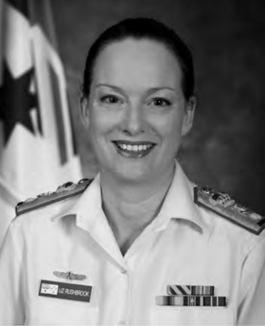- Author
- A.N. Other
- Subjects
- None noted
- Tags
-
- RAN Ships
- None noted.
- Publication
- February 2018 edition of the Naval Historical Review (all rights reserved)
By CDRE Liz Rushbrook, Director General, Naval Health Service
I am pleased to participate in this retrospective glimpse of our Naval Health Service. The Service, like the RAN, came into existence just over a century ago and during this time we have learned much from past experiences. We now carry forward our fine traditions and the best of the lessons learned into a bright future.
As incoming Director General Navy Health Service, it is an enormous privilege and honour to ‘hold the tiller’ for the Navy Health Service. I am conscious of the excellent work done by my predecessors and the Health Service in general, and look forward to working with the Navy Health Service team to progress the effort so that we can collectively continue to achieve excellent outcomes for the Navy and the Australian Defence Force.
From my time as a medical student in Brisbane in the late 80s and early 90s and through my formative years as a junior medical officer providing primary and emergency care in the fleet, I collected many experiences and lessons that have formed the foundation of my energy and commitment to ensure the Navy Health Service is meeting its obligations. These have been reinforced and refined in recent years as I managed Navy and ADF health centres, hospital facilities and the Navy Health Service. In this context, there are some key areas that I will focus on.

The first is health service reform. In the Australian workforce and health service reform, the Navy Health Service has a significant role to play in the broader ADF Strategic Reform Program. Providing streamlined health services at sea, and ensuring our healthcare workforce is competent, current and effective is our core business and the yardstick for our performance. A key requirement is ensuring that our training continuum is best practice.
A wholesale review of our Medical sailor, Medical and Dental Sailor registration/licensing, Medical Administration professionalisation and health workforce innovation (e.g. the role of Nurse Practitioners, Physician Assistants and extended scope of practice for Allied Health Professionals) are initiatives on the short-term horizon.
The second is health service excellence. Professionalism and excellence within the Navy Health Services is fundamental to ensuring Navy can deliver the levels of capability that the government resources us for and expects us to deliver. Benchmarking, Standards, Clinical Governance and Continuous Improvement are the key to achieving health service excellence and I am absolutely committed to ensuring that the Navy Health Service is a leader in these areas.
My third area of focus is positive transformation. With important new reforms such as the new amphibious ships and other changing roles in hospital deployments it is important that we work closely with the wider Navy and other parts of Defence so that reliable health services are provided and delivered on time and on that we take care of the wellbeing and development of our Health Community during this time is important. I intend to ensure that I take every opportunity to listen to and communicate with the Navy Health Service team so that the Navy Health Service of the near future is one of which we can all be justly proud.
As a proud mother of three boys, Jordan 10, William 7 and Thomas 6, and with the support of my husband, Andrew, I look forward to working with the excellent men and women of the Navy Health Service to meet the challenges ahead, and quietly celebrating the sense of achievement that will be gained by finding and implementing some of the solutions.
Only one rule in medical ethics need concern you – that action on your part which best conserves the interests of your patient. Martin H. Fischer (1879-1962)
